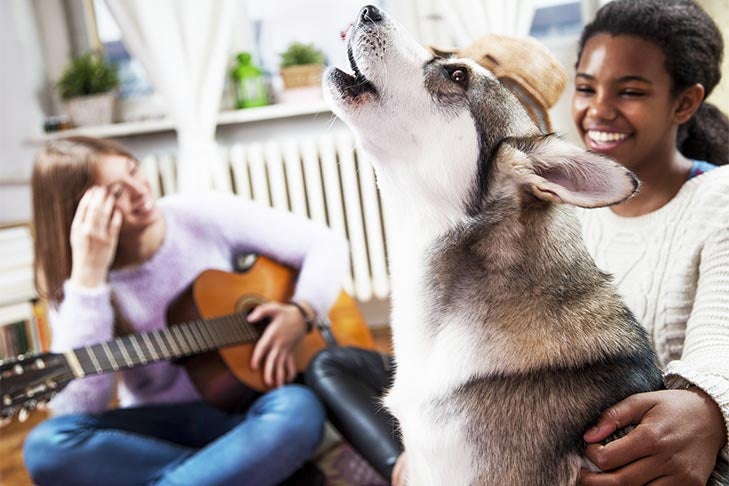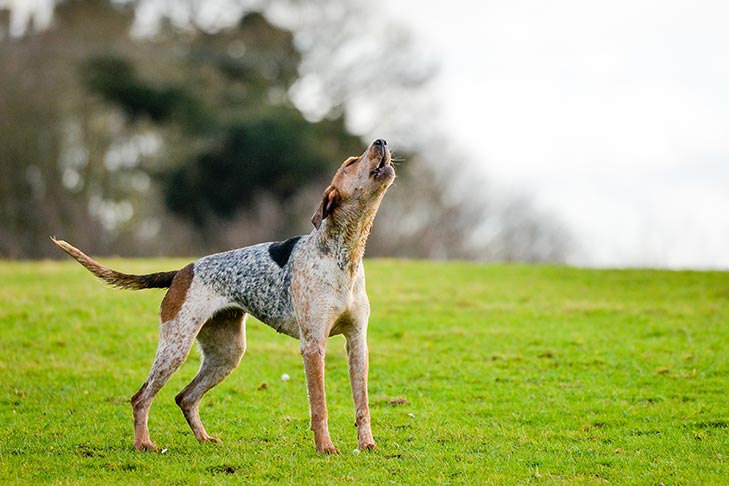
It’s impossible to ignore a wolf’s eerie yet beautiful howl. Some people even go on hikes specifically to hear this haunting sound. Howling is also a common dog behavior — but why do dogs howl? Is it a throwback to their wolf ancestry? Or are there different reasons behind the call?
Why Do Wolves Howl?
In wolves, howling serves to communicate over long distances. That’s why the sound has evolved to carry so well over large spaces. Members of a wolf pack might howl to stay in touch with one another. For example, pups in the den will howl to communicate with pack members who are out roaming. Pack members might also howl to each other before hunting together.
But howling also serves to maintain a pack’s territory. This sound sends a signal to unknown wolves to keep out. Because of its function, howling is often a group activity. One wolf’s howl can set off a chain reaction of howling in other wolves.
Why Do Dogs Howl?
If dogs are descended from a wolf ancestor, then do they use howls in the same way? Well, dogs live in a very different environment and have their own distinct social system. We can’t expect dogs and wolves to communicate in exactly the same way. For example, dogs bark far more than wolves. So, dog howling may mean something different too.

In fact, scientists aren’t completely sure why dogs howl. But it seems there are similarities between dogs howling and wolves howling. It is definitely a communication signal for dogs, just like barking, whining, or growling. Howling seems to serve a social purpose, a dog’s way of saying, “Here I am.”
Reasons Dogs Howl
Dogs Howl to Get Attention
Some dogs quickly learn that howling is a great way to demand your attention. Try to avoid rewarding howling with attention, since even negative attention can reinforce bad behavior. Instead, teach a quiet cue or reward alternate behaviors so your dog learns other ways of gaining your focus.
Dogs Howl to Communicate with People or Other Dogs
Your dog might howl when they hear you walking toward your front door or when they’re separated from other dogs. This may be a way to connect with you or with another dog.
Dogs Howl to Let Others Know They’re There
Your dog might howl in the yard to catch the ear of other neighborhood dogs. Perhaps they’re vocally marking their territory, or maybe they’re just saying hello, but it’s certainly contagious. Your dog could also howl to warn intruders to stay away.
Dogs Howl to Express Emotions
Lonely and anxious dogs often howl, maybe as a way to request company or assistance. In fact, many dogs with separation anxiety howl when their owners are away. A study on behavior patterns in dogs with separation anxiety showed that their howling was likely related to fear.
Dogs Howl to Convey Pain or Discomfort
If your usually quiet dog begins to vocalize (including howling) more than normal, it may be a response to sickness or pain. It’s a good idea to bring them to the vet to rule out any underlying health issues.
Dogs Howl to Respond to Triggering Noises
To respond to triggering sounds: Why do dogs howl at sirens? High-pitched wailing noises, like sirens or certain notes played on a musical instrument, can often cause dogs to howl. Your dog may understand these noises as being similar to howls, so they might simply be adding to the chorus.
Do Dogs Howl as an Indicator of Death?

Some cultures believe that a dog’s howl predicts that someone is about to die. Some even say that dogs howl right before their own deaths. Of course, there are a lot of myths about dogs having supernatural abilities. Because canine behavior is sometimes hard to understand, people may invent explanations. However, there is no conclusive proof that dogs howl to indicate somebody is about to die. It may be a coincidence, or perhaps the dog is reacting to a change in their situation (such as separation from a beloved but ill owner).
Do Some Breeds Howl More Than Others?
Just as certain dog breeds like Chihuahuas or Yorkshire Terriers are known for their barking, some breeds howl more than others. A research study on how dogs react to wolf howls found that ancient breeds — those breeds most closely genetically related to wolves, such as Siberian Huskies, Chow Chows, and Basenjis — howl more frequently than more recently developed breeds, like the Golden Retriever. However, researchers noted that age may be a factor, as well. In their study, older dogs belonging to ancient breeds tended to howl more than younger dogs, regardless of their breed. Scientists did find that the reverse was true for barking. Ancient breeds only barked under certain conditions, while newer breeds used barking in many situations.

Then there’s baying, which is a little like howling, but more of a lower-pitched, prolonged bark. This is a popular vocalization among hound breeds like Beagles or Black and Tan Coonhounds. While hunting, dogs will bay. This informs humans or other dogs in the pack that the baying dog has found the scent of their quarry.
Whether your dog is howling to tell other dogs to stay away or baying to ask them to join in the hunt, the point is to communicate. By understanding why your dog howls, you can better appreciate their message and enjoy their voice in all its varied sounds.

